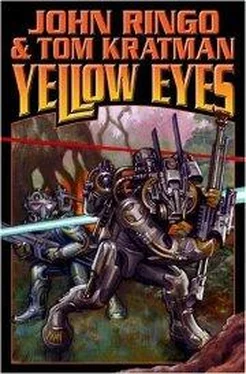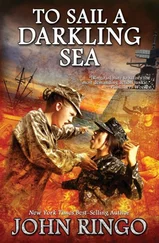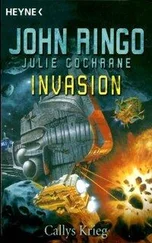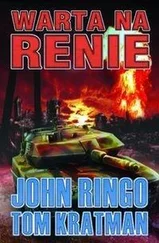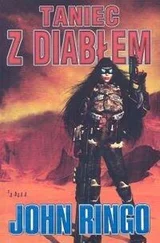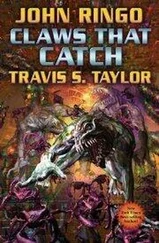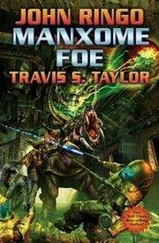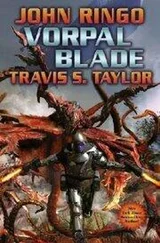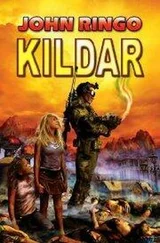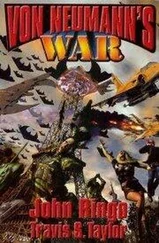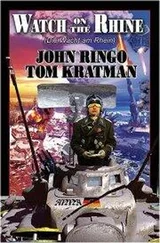The outer defenses of the city were crumbling now, Guanamarioch sensed. The sounds of battle — the thunder of railguns, the clash of the boma blades, the cries of the wounded and dying — grew ever closer.
He felt a slight envy for those Kessentai chosen to stay behind and cover the retreat to and loading of the ships that would take the clan to their new home. Their names were recorded in the Scrolls of Remembrance and they would be read off at intervals to remind the People of their sacrifice. That was as much immortality as any of the Po’oslena’ar, the People of the Ships, might aspire to.
Yet instead of leading his oolt into the fight, Guanamarioch on his hovering tenar led them as they marched four abreast and one hundred deep towards the waiting ship. Other oolt’os, similarly, formed long snaking columns from the city’s outskirts all the way to the heavily defended spaceport.
Impatiently, the Kenstain in charge of the loading directed Guanamarioch to bring his charges to a particular ship and to load at a particular gate.
“And be quick, you,” the Kenstain demanded. “There is little time left before the ships must leave.”
Ordinarily the Kessentai would have removed the Kenstain’s head for such impertinence. This was, however, a time of desperation, a time when minor infractions had to be overlooked. Obediently, riding his tenar, the God King led his normals to the designated ship.
At the ship another Kenstain directed cosslain, a mutated breed of normals that were nearly sentient, to take Guanamarioch’s tenar and stow it. The God King removed his Artificial Sentience from the tenar, hanging it around his neck, as the cosslain took the flying sled away.
“Lord,” the castellan said, “your oolt is the last for this ship. The place for you and your band is prepared. Directions have been downloaded to your Artificial Sentience. Just follow it and stow the normals, then report to the captain of the ship.”
“Are you loading then?” asked Guanamarioch.
The Kenstain shook his head, perhaps a bit sadly.
“No, lord,” he answered, his teeth baring in a sad smile and his yellow eyes looking sadder still. “I will stay here and keep loading ships until there are either no more ships, or no more passengers… or until the enemy overrun the last ship we are able to begin loading.”
The God King reached out a single grasping member and touched the castellan, warmly, on the shoulder. “Good luck to you, then, Kenstain.”
“That, lord, I think I shall not have. Yet there are worse ways to die than saving one’s own people.”
“It is so,” Guanamarioch agreed.
The United States and Panama are partners in a great work which is now being done here on the Isthmus. We are joint trustees for all the world doing that work.
— President Theodore Roosevelt, 1906
Panama
The country lay on its side, more or less, in a feminine S-curve stretching from west to east and joining the continents of North and South America. Beginning at the border with Costa Rica it ran generally east-southeast for a third of the way. Conversely, from its border with Colombia in the thick and nearly impenetrable Darien jungle it ran a third of the way west-northwest. The waist of the country, also feminine and narrow, went from the rump — the Peninsula de Azuero — that jutted out into the Pacific and then east-northeast to meet the land running from Colombia roughly one third of the way from the Colombian border.
Down the center of the country ran a spine of mountains with few passes and fewer roads running across it. North of this spine, the Cordillera Central, was mostly jungle, with a few cities and towns. South was, at least from the Costa Rican border to the narrow waist, mostly farm and pasture. There were two major highways, the Pan-American which ran generally parallel to the Cordillera on the southern side, and the Inter-American which ran the much shorter distance from Panama City in the south to Colon in the north.
More than half of the people of the place lived in the two provinces of Colon (not quite half a million) and Panama (about a million and a half). Of the rest, most lived close to the Pan-American highway where it ran from Panama City to the border with Costa Rica, south of the Cordillera Central.
The highway that joined the cities of Colon and Panama was not the only link between them. Colon fronted on the Caribbean to the north. Panama City edged along the Pacific to the south. Between them, like a narrow belt on a woman’s narrow waist, ran an artificial body of water that linked Colon and Panama City, linked the Atlantic and Pacific oceans and, in the process, linked the world.
This was the Panama Canal.
She’d been carved out of the living rock through an emerald-hued hell. Men had died in droves for every yard of her; died of the fever, of the rockslides, of the malaria, of a dozen tropical diseases to which they had had no cure and, initially, little defense. They’d died, too, of the drink that anesthetized them from the misery of their surroundings.
She’d broken one attempt to tame her; broken the men, chewed them up and spit out their corpses to rot. The skeletal remains of their rusted machines, vine grown and half sunken, still dotted the jungle landscape, here and there. But men were determined beasts and, eventually, had broken her in return.
For generations she had been the single most strategically important ten-mile-wide strip of land in the world. The commerce of all the continents and innumerable lesser islands passed through her, a lifeblood of trade. The nation which had owned her had ruled the seas with the power of commerce and with the power of war.
Two hundred and forty inches of rain a year were just barely enough to slake her thirst. A small fleet of dredgers were just enough to keep her free of the silt those rains washed down. Throughout her heyday the lives and labors of seventy thousand human beings had had no higher purpose than to serve and defend her.
She was the Panama Canal and, though aged and faded, she remained a beauty.
Yet her heyday had passed. The nation which had built her had lost interest as the greatest ships of war and commerce had outgrown her limits, as the people and nation that hosted her had grown to resent the affront to their sovereignty that foreign ownership of the Canal had represented. In truth, though, once the great enemies — Nazism, Fascism and Communism — had fallen, the security the Canal had represented had become, or come to seem, slightly superfluous.
Times change, though. Perceptions change.
The Pentagon
Deep in the bowels of the “Puzzle Palace,” in a room few were aware of and fewer still ever visited, a troubled man gazed over the heads of banks of uniformed men and women sitting at computer terminals, onto an electronic map of the world glowing from a large plasma television. That monitor was one of three. To the right was shown a map of the continental United States and North America; to the left, generated by a complex computer program, a spreadsheet marked the anticipated decay of necessary world trade under the impact of Posleen invasion.
“We’re just fucked,” announced the man, a recalled three star general with vast experience in complex logistics and no little feel for commerce.
He repeated himself, needlessly, “Fucked.”
As the general watched, a red stain spread out across the center of the right-hand screen. As it spread, numbers dropped on the spreadsheet, some of the numbers changing color from solid green to blue to red to black. In a few cases those number dropped to zero and began to blink urgently.
Читать дальше
